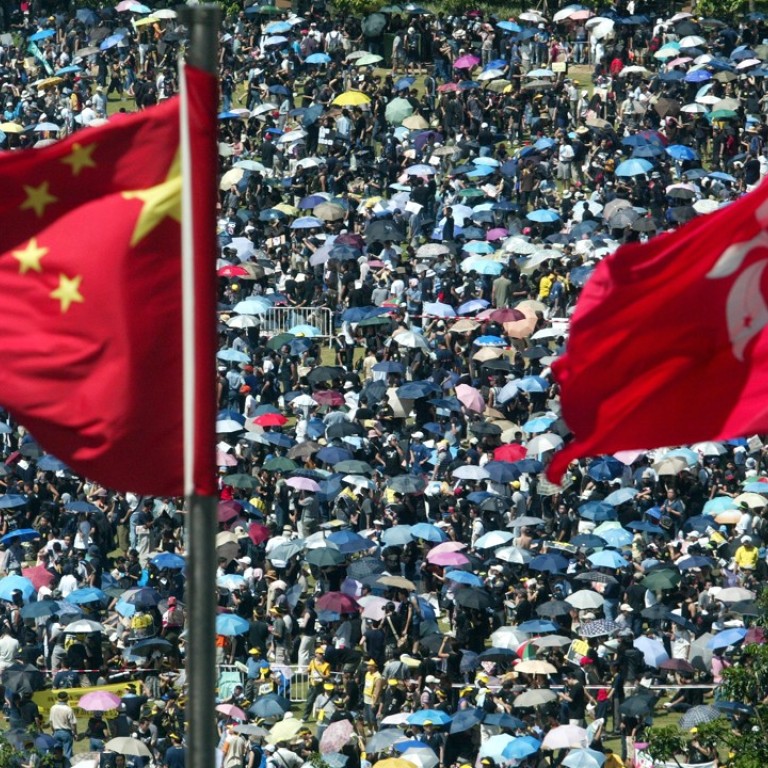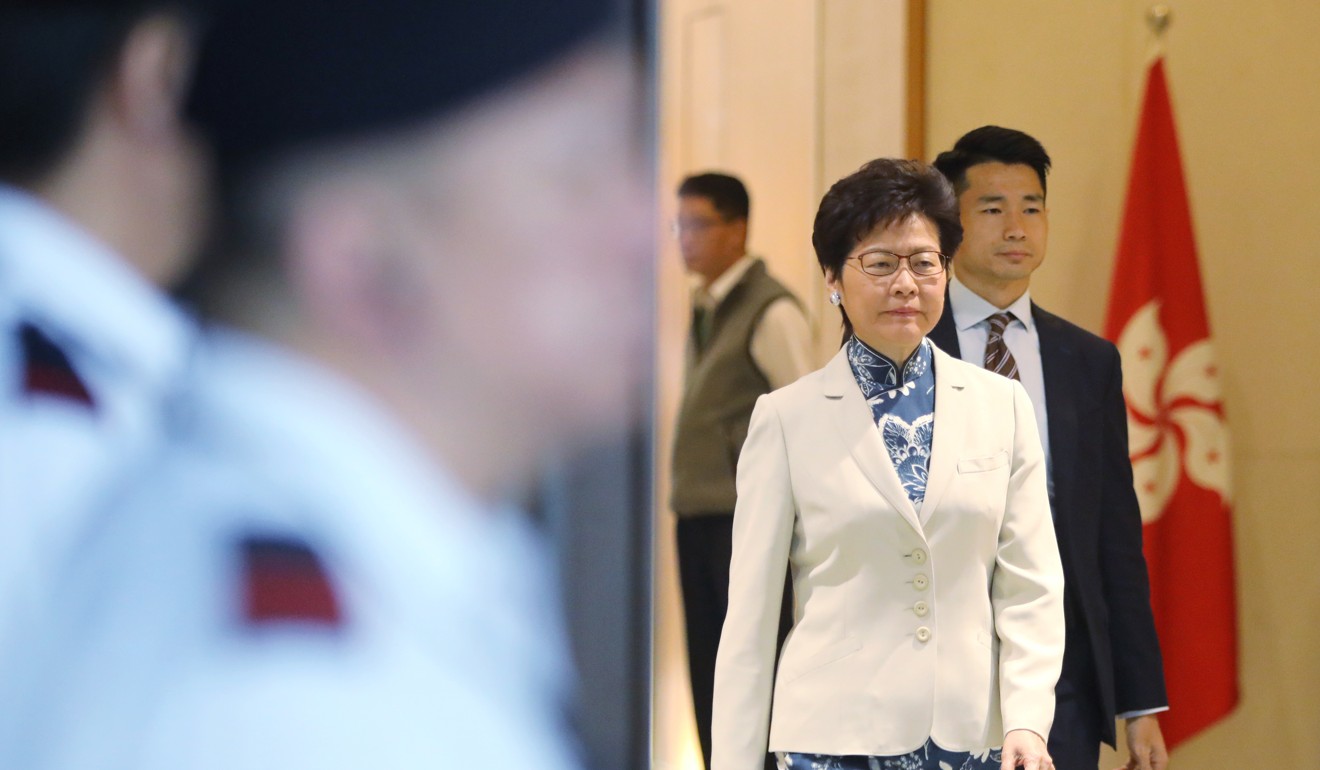
Will Andy Chan separatist saga force Hong Kong leader Carrie Lam to act on national security law?
As the row over Andy Chan’s call for independence rumbles on, pro-establishment camp calls for quicker action and tougher legislation, while city’s leader continues to wait for ‘favourable atmosphere’
The storm over a minor Hong Kong political party’s calls for independence has renewed demands from Beijing loyalists for a national security law, although observers do not expect such legislation to be proposed before 2020, or even 2022.
Since Hong Kong National Party (HKNP) leader Andy Chan Ho-tin repeated his party’s calls for independence when he addressed the Foreign Correspondents’ Club (FCC) earlier this month, the demand for the law to be made tougher has also heightened.

But, analysts believe the current political climate has made it almost impossible for her to avoid taking action, although they feel Hongkongers would react badly to any new attempt to push ahead with a national security law.
It will be a political hot potato and, with citywide elections next year and in 2020, the pro-establishment bloc pressing for the law may find itself hardest hit, they said.
Several Beijing loyalists told the Post the time is right for a tougher piece of legislation to deal with activists such as Chan, who has been given until September 11 to persuade authorities to not ban his party.
We pay the price of Andy Chan’s free speech
The HKNP saga has revealed the city’s “inadequacies” in protecting national security, said Zhang Xiaoming, director of the State Council’s Hong Kong and Macau Affairs Office.
“People in the past thought ‘Hong Kong independence’ was a non-issue. But now, someone is really advocating it, forming a party and trying to actualise it,” Tam said.
Political scientist Ray Yep Kin-man, from City University, said the HKNP issue provided the pro-Beijing camp with an opportunity to call for reintroducing Article 23, and said Lam was being pressured by hardliners locally, as well as in the central government.
In 2003, the Hong Kong government failed to push through draft bill of Article 23 legislation to prohibit acts of treason, secession and sedition. It was shelved after half a million people took to the streets on July 1 to protest against the Bill, saying it attacked Hongkongers’ freedom of speech and was ambiguous on what speech or actions could attract criminal liability.
Beijing was unhappy with the outcome and has signalled impatience over the years, but Lam’s two predecessors steered clear of reintroducing the controversial legislation.
Andy Chan cannot be charged under current Hong Kong law, city lawyers say
During 2002 and 2003, government officials tried to dispel fears over the bill by emphasising that speech alone – in the absence of violence or illegal acts – would not result in prosecution.
But the pro-Beijing camp criticised this for being a watered down position, and called for tough penalties against anyone that even chanted for independence.
Alan Hoo, chairman of the Basic Law Institute and a delegate to the Chinese People's Political Consultative Conference, rejected the notion of revisiting the 2003 bill and said it “did not provide a correct balance between national security and freedom of speech”.
“Beijing and the pro-establishment camp are well aware that no one would use violence to promote independence,” he said.
On the question of when the government might push for new legislation, political watcher Chung Kim-wah of Polytechnic University said there is little chance Lam will act any time soon.
He said Leung had escalated matters in the recent row over the HKNP, by criticising Chan, and the FCC for providing a platform for the separatists to promote their cause. Leung’s actions only helped to make the atmosphere worse for reintroducing Article 23 legislation now, Chung said.
The government will have to consider the upcoming district council elections next year, and the Legislative Council elections in 2020, he said, as any move to push ahead with national security laws would inevitably affect its allies’ chances at the polls.
A national security law must reflect the special rights of Hong Kong
Yep said much depended on whether Lam intends to seek re-election in 2022.
“If she intends to serve a second term, why would she raise the issue before the beginning of her second term and get into a fight with civil society?” he said. “For the time being, all she needs to do is resort to measures available under the existing legal framework.”
Among the measures available is to go ahead with the unprecedented police proposal to ban the HKNP, he said.
“It served as a compromise for Lam, who can then tell the central government, ‘I have been working on this [cracking down on separatists],” he said. “That will ease the pressure, and the legal proceedings following the ban could well take more than a year.”
Ronny Tong Ka-wah, an adviser to Lam, said Hong Kong needs a rational and in-depth discussion to strike a proper balance between national security and human rights, and pushing for Article 23 legislation too quickly could result in a “sad ending”.
No complaints against Benny Tai over independence remarks, says HKU law dean
Tong has suggested the pro-establishment and democratic camps should discuss the issue thoroughly to find common ground from the 2003 bill, and legislate what they agree on. He conceded, however, that both camps have shown little interest in having such a dialogue.
Tai said any future Article 23 legislation must include safeguards for genuine democracy, or else it could hamper the city’s freedom and human rights.
“In order for Beijing to have more confidence in Hong Kong, we could add a commencement date to Article 23 legislation, so the effective date of the national security law would be when Hong Kong has genuine universal suffrage,” Tai said.
Tam Yiu-chung said Lam should at least start making preparations, adding that she had enough time to complete the new legislation during her current term of office, which ends in July 2022.
“Just sitting and waiting is not enough,” he said.
Additional reporting by Kimmy Chung



